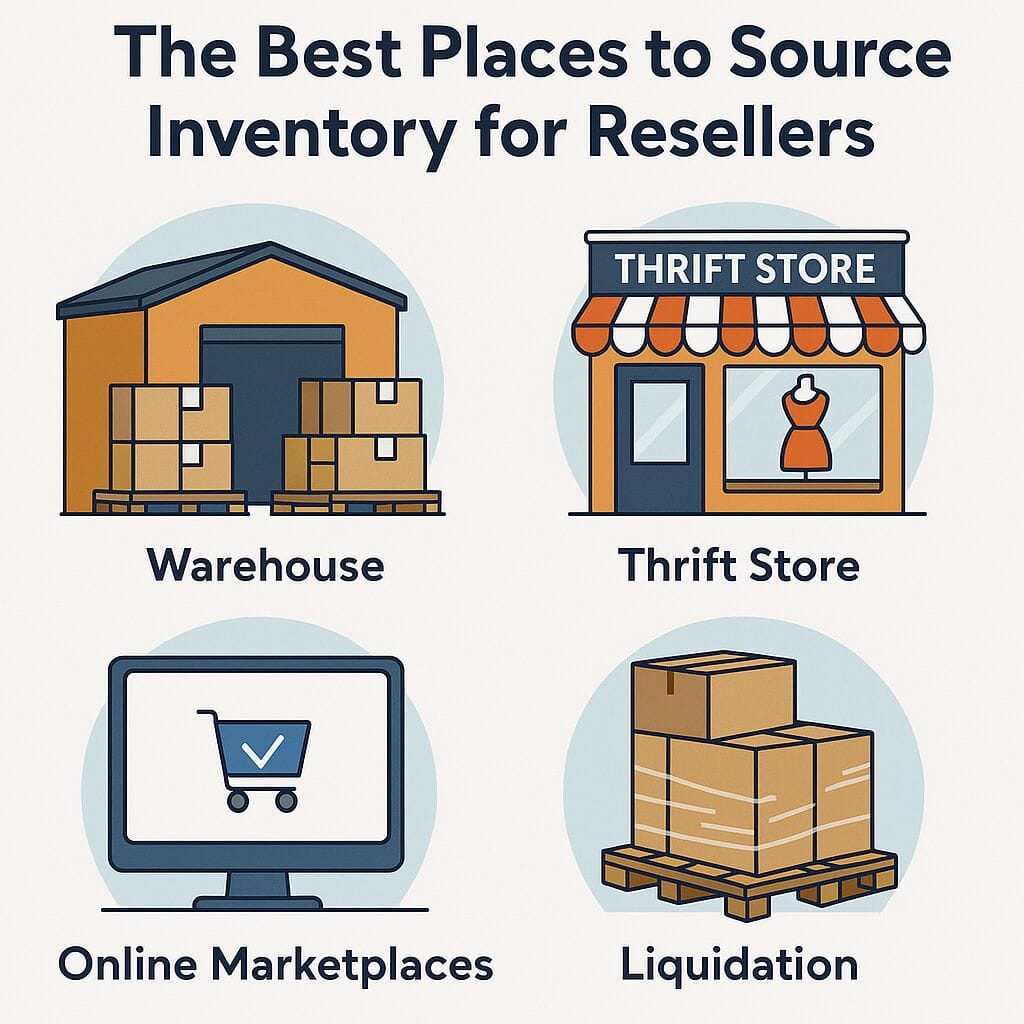For resellers and eCommerce sellers, sourcing the right inventory is one of the most important steps toward long-term sustained success. When sellers can consistently find quality products at competitive prices, they’re better positioned to earn healthy profit margins and stay ahead of the competition. However, not all sourcing options are created equal. Some are reliable and profitable, while others can lead to issues like poor product quality, long shipping delays, or low resale value.
This article highlights some of the best place’s resellers can turn to when sourcing inventory. From online platforms to local opportunities, these sources can help sellers build a strong, profitable product lineup.

Online Wholesale Marketplaces
Online wholesale marketplaces are one of the most popular sourcing options for resellers. These platforms connect buyers directly with manufacturers and wholesalers, often allowing bulk purchases at lower per-unit costs.
Websites like Alibaba, Faire, Tundra, and Abound offer a wide variety of products across categories like fashion, electronics, home goods, and beauty. Some platforms cater to small businesses by offering low minimum order quantities and flexible shipping options.
While online wholesale marketplaces can be a great way to access global suppliers, resellers should take time to research sellers, read reviews, and request samples when possible. Doing so helps reduce the risk of receiving poor-quality goods or experiencing long delivery times.
For resellers who want to scale or diversify their product offerings, wholesale marketplaces offer broad access and competitive pricing.
The Reseller Source Platform
The Reseller Source is an online marketplace designed specifically for resellers on platforms like Whatnot, Poshmark, eBay, and more. It offers a wide range of high-quality discounted products, helping resellers source profitable inventory without the usual trial and error. Through direct partnerships with brands, manufacturers, retailers, and wholesalers, The Reseller Source delivers top-tier products at competitive prices.
Resellers using the platform can explore a wide range of inventory categories from clothing, to footwear, housewares, general merchandise, electronics, and more. Their inventory includes overstock, closeouts, customer returns, shelf-pulls, and trending items. Whether selling on marketplaces like eBay, Whatnot, Amazon, or running a physical discount or bin store, users can find inventory tailored to their business model.
One of the platform’s key advantages is its supplier network. All listings come from reliable sources, and resellers don’t need to pay membership fees to access deals. New inventory is added regularly, giving users fresh opportunities to purchase in-demand products.
For those who want a centralized place to find resellable merchandise from legitimate suppliers, The Reseller Source offers a simple and effective solution.
Liquidation and Overstock Companies
Liquidation and overstock companies give resellers access to products that major retailers no longer plan to sell. These can include overstock, shelf-pulls, closeouts, and excess inventory, and even customer returns.
Inventory liquidation companies such as Total Surplus Solutions, We Buy Overstock, Overstock Trader and similar platforms allow buyers to purchase goods in bulk at significant discounts. They provide detailed manifests that outline what’s included in each lot, making it easier to assess potential resale value.
While liquidation sourcing can offer high profit margins, it’s important for resellers to understand the risks. Product conditions may vary, and some lots are sold “as is.” Reviewing seller ratings and choosing lots with clear descriptions or manifests can help reduce surprises.
This sourcing method is especially useful for resellers who operate in discount, thrift, or bin store environments where buyers expect lower prices and fast inventory turnover.
Local Sourcing Opportunities
Local sourcing is a cost-effective and often overlooked way for resellers to find unique or high-margin products. Thrift stores, estate sales, garage sales, and flea markets can be excellent sources for secondhand or vintage items that appeal to niche audiences.
Resellers can also explore local auctions, including estate, business, and storage unit auctions. These events often offer bulk lots at low prices, especially when items need to be cleared quickly.
Another smart strategy is building relationships with local businesses that may have excess, discontinued, or seasonal inventory. These partnerships can lead to exclusive deals or first access to unsold stock.
The main benefit of sourcing locally is the ability to inspect products in person, negotiate pricing, and avoid shipping costs. This method works well for resellers who prefer hands-on buying or are looking for one-of-a-kind finds.
Flipping Retail Clearance
Flipping retail clearance items involves purchasing discounted products from retail stores and reselling them online at a profit. Many resellers find deals in clearance aisles, seasonal markdowns, or limited-time promotions at big-box stores, department stores, and outlet malls.
This sourcing method is especially popular among sellers on platforms like Amazon, eBay, and Facebook Marketplace. Tools such as the Amazon Seller App or BrickSeek can help identify profitable items and track local inventory availability.
Flipping retail clearance items (retail arbitrage) requires time, research, and sometimes travel, but it can yield quick returns, especially for trending or limited-edition products. Success depends on identifying demand, calculating margins after fees, and acting quickly before stock sells out.
This approach is ideal for resellers who are hands-on, responsive to trends, and looking for low upfront investment to test new product ideas.
Private Label and Contract Manufacturers
For those resellers looking to take things to the level, private label and contract manufacturing allows resellers to create custom-branded products without owning a factory. This sourcing method is ideal for sellers who want to build their own brand and offer something unique in the market.
Manufacturers handle everything from product formulation and packaging to labeling and bulk production. This model is especially popular in categories like supplements, cosmetics, personal care, and apparel.
Platforms like Find My Manufacturer or Thomasnet help connect sellers with reliable manufacturing partners. Many offer low minimum order quantities and flexible customization options to support both new and growing brands.
While private labeling requires more planning and a higher upfront investment, it gives sellers greater control over pricing, product quality, and brand identity. It’s best suited for resellers looking to move beyond flipping and build long-term value through brand ownership.
Dropshipping Suppliers
Dropshipping is a low-risk sourcing model where sellers list products for sale without holding any inventory. When an order is placed, the supplier ships the product directly to the customer. This approach eliminates the need for warehousing and upfront stock purchases.
Popular dropshipping platforms include Spocket, CJ Dropshipping, Syncee, and Modalyst. These services offer access to thousands of products across categories like fashion, electronics, home goods, and more. Some even focus on US or EU-based suppliers to ensure faster shipping times.
Dropshipping is ideal for new resellers or those testing new product niches. However, success depends on choosing reliable suppliers, managing customer expectations, and staying on top of product availability and pricing.
While the profit margins can be lower compared to buying in bulk, the ability to launch quickly and scale without inventory makes dropshipping an attractive sourcing option for many online sellers.
FEATURED NEWS: Arizona housing market: Cautious optimism meets complex realities
INDUSTRY INSIGHTS: Want more news like this? Get our free newsletter here
How to Choose the Right Sourcing Channel
With so many sourcing options available, it’s important for resellers to choose channels that align with their goals, budget, and business model. There’s no one-size-fits-all solution, so evaluating each option carefully can make a big difference in long-term profitability.
Key factors to consider include product quality, pricing, shipping speed, supplier reliability, and minimum order requirements. It’s also important to calculate expected profit margins after fees, storage, and shipping costs.
Resellers should also think about how much control they want over the customer experience. For example, private label sellers manage their own branding and packaging, while dropshippers rely on third-party suppliers for fulfillment.
Combining multiple sourcing strategies can also be a smart move. Many successful resellers mix wholesale, liquidation, retail arbitrage, and private label to stay flexible and competitive in different markets.
Conclusion
Sourcing the right inventory is one of the most important steps for resellers aiming to grow and stay competitive. From wholesale marketplaces and liquidation platforms to local finds and custom manufacturing, there are many reliable options available for every type of reseller.
Each sourcing method has its own strengths, whether it’s the flexibility of dropshipping, the control of private labeling, or the fast turnaround of retail arbitrage. The key is to understand your goals, evaluate each option carefully, and choose sources that align with your business strategy.
Exploring multiple channels can help resellers stay adaptable and uncover new opportunities. With the right sourcing approach, building a profitable and sustainable reselling business becomes much more achievable.




